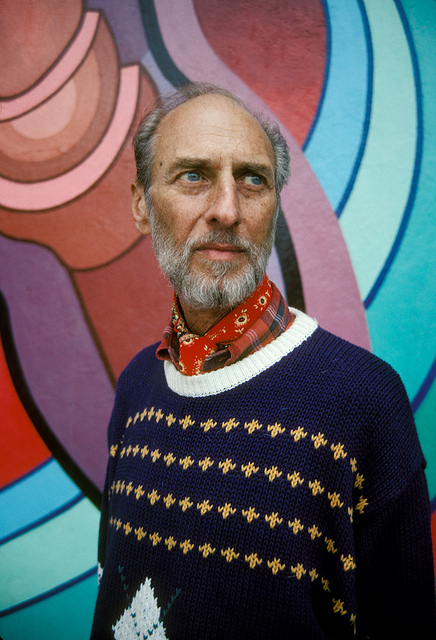Photo by Peter Bennet
Arnold Belkin, 1930-1992
Although Belkin was born and raised in Western Canada, he wasn’t drawn to the Canadian tradition of landscape painting. Instead, he identified with the work of Mexican muralists.
Belkin was born in Calgary, Alberta in 1930 and raised in Vancouver. At fourteen, Belkin discovered Mexican artist, Diego Rivera in a magazine. Belkin was excited by the social realism of his murals and the focus on the figure, something that was not popular in Canada’s landscape-focused art of the time. This discovery would have a profound impact on Belkin’s life and work; political corruption, abuse of power, military force and social injustice were subjects he would focus on throughout his career.
Belkin cultivated this interest in social issues and the rights of the poor and underprivileged classes while still living in Vancouver, and in 1947, after completing his initial studies at the Vancouver School of Art, Belkin immediately moved to Mexico City. He enrolled at la Esmeralda School of Painting and Engraving, and sought out muralist David Alfaro Siqueiros as his mentor.
Belkin’s first mural was at a new federal penitentiary, titled, Somos Todos Cupables (We Are All Guilty). Other commissions followed; Identity and Future at Colegio Madrid, Jewish Festival, at the Jewish Centre and A nuestra generación corresponde decidir (It Rests with Our Generation to Decide) at the Child Welfare Centre. This work was whitewashed soon after completion as the wife of the Mexican president found it too depressing. Belkin protested the removal of his mural, however, the destruction of murals was commonplace in Mexico and several artists before Belkin, including Diego Rivera and Siqueiros, had also had their murals whitewashed.
In 1968, like Diego Rivera, Belkin went to live and work in New York City. He was commissioned to complete a massive mural in Hell's Kitchen. He enlisted the community to assist him in the project, titled "Against Domestic Colonialism”.
Although Belkin enjoyed success in New York with his smaller canvases, he returned to Mexico in 1976 and became a Mexican citizen in 1981.
Belkin's career spanned more than three decades, during which time he produced 28 major public murals and 50 exhibitions.
Arnold Belkin died in Mexico City in 1992 of lung cancer.
Selected Collections
The Feckless Collection, Vancouver, BC
Smithsonian American Art Museum, Washington, DC




